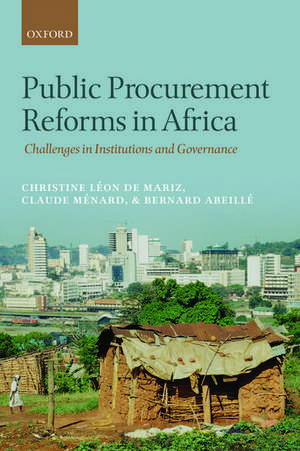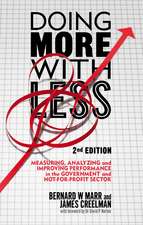Public Procurement Reforms in Africa: Challenges in Institutions and Governance
Autor Christine Léon de Mariz, Claude Ménard, Bernard Abeilléen Limba Engleză Hardback – 14 aug 2014
Preț: 670.93 lei
Preț vechi: 964.26 lei
-30% Nou
Puncte Express: 1006
Preț estimativ în valută:
128.38€ • 134.04$ • 106.25£
128.38€ • 134.04$ • 106.25£
Carte disponibilă
Livrare economică 03-10 martie
Preluare comenzi: 021 569.72.76
Specificații
ISBN-13: 9780198714910
ISBN-10: 0198714912
Pagini: 226
Ilustrații: 21 Figures, 16 Tables, 8 Boxes
Dimensiuni: 162 x 241 x 17 mm
Greutate: 0.49 kg
Editura: OUP OXFORD
Colecția OUP Oxford
Locul publicării:Oxford, United Kingdom
ISBN-10: 0198714912
Pagini: 226
Ilustrații: 21 Figures, 16 Tables, 8 Boxes
Dimensiuni: 162 x 241 x 17 mm
Greutate: 0.49 kg
Editura: OUP OXFORD
Colecția OUP Oxford
Locul publicării:Oxford, United Kingdom
Notă biografică
Christine Léon de Mariz was a Senior Economist at the World Bank and has more than a decade of experience in international development. She managed projects focusing on institution, governance, and public finance in Africa, the Middle East, and Latin America. Christine is a graduate of Sciences-Po Paris, holds a PhD in Economics from the University of Paris (Panthéon-Sorbonne), and was a fellow at Harvard University.Claude Ménard is Professor of Economics at the University of Paris (Panthéon-Sorbonne) and affiliated to the Centre d'Economie de la Sorbonne. He graduated from the University of Montréal in Canada and completed his PhD at the Sorbonne. He has been visiting professor in numerous universities worldwide, has published extensively in international journals, and has worked as consultant for several international organizations and governments, mainly on issues of reform in network infrastructures and institutional changes. He has been co-editor of the Journal of Economic Behavior and Organization for over ten years, and is a co-founder with Ronald Coase, Douglas North, Oliver Williamson and others of the International Society for New Institutional Economics. He is also co-founder and member of the board of the Ronald Coase Institute.Bernard Abeillé is a Public Procurement Specialist who initially worked in the private sector in major infrastructure and city planning programs, 10 years in French Aid abroad, and more than 30 years at the World Bank. He has been head of the procurement family for the Africa region and has assumed important responsibility in the World Bank Procurement Board. He initiated major procurement reforms and played a major role in the working group that issued the OECD Procurement Base-Line Indicators which are now applied worldwide to evaluate national procurement systems. Since he retired, he has been a consultant for the World Bank, African Development Bank, Millennium Challenge Corporation, Agence Française de Développement, and Inter-American Development Bank, and has been involved in numerous training programs to develop capacity in developing countries. His academic background is in architecture, city planning, legal aspects of construction and regional development.












